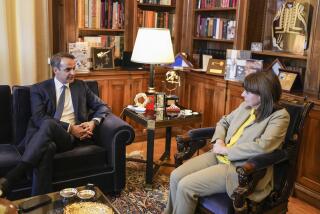Anti-American Stance Seen as Election Ploy : Papandreou Victory May Smooth Greek Ties to U.S.
- Share via
ATHENS — The surprising resurgence of Prime Minister Andreas Papandreou’s Socialist Party in Sunday’s Greek parliamentary election may have the unexpected effect of smoothing the country’s sometimes rocky relationship with the United States and Western Europe, diplomats said Monday.
The intensely nationalistic prime minister had been faltering in pre-election polls to such an extent that most political analysts predicted that he would lose his parliamentary majority and be forced into a coalition with the Communists in order to remain in power.
But Papandreou’s Panhellenic Socialist Movement (PASOK) surprised the analysts and won 161 seats, a majority of 11, in the 300-member Parliament to begin its second four-year term. It is the first leftist government in modern Greek political history.
The first term of Papandreou, 67, a former American economics professor, was marked by difficult relations with the West and a flirtation with Moscow that probably reached a peak, at least in terms of Western exasperation, when he refused to condemn the Soviets for shooting down a South Korean airliner in 1983.
When he first swept to power in 1981, he threatened to pull Greece out of the North Atlantic Treaty Organization and the European Community and to shut down American military bases in the country. Since then, Papandreou has kept Western nerves on edge with so-far unfulfilled threats to act on the pledges, which would leave a deep gap in NATO’s defenses in southern Europe.
That is why a shudder ran through Western embassies in Athens when the possibility of a Communist-Socialist coalition emerged from pre-election polling that showed Papandreou slipping badly.
The Communists had made clear before election day that their price for adding their parliamentary seats to those of Papandreou’s Socialists--to give Papandreou a ruling majority--would be immediate steps to carry out the anti-Western measures that he promised in 1981.
Karamanlis’ Evidence
The fact that he has not kept the promises, despite extreme pressure from the radical left wing of his own party and from the Communists, may have stemmed from the conservative influence of pro-Western former President Constantine Karamanlis, whom Papandreou dumped in March, provoking the political crisis that led to Sunday’s elections.
Western diplomatic sources here say the prime minister has economic reasons as well not to upset the status quo, namely an annual $500 million aid package from the United States and $700 million in subsidies from the European Community, of which Greece is one of the poorest members. The Greek economy is in such bad shape that any loss of foreign aid could throw it into a tailspin.
But some Western diplomats here--who once thought that the unpredictable Papandreou seriously intended to carry out his radical pledges to dismantle the old alliances and move Greece into the nonaligned camp--now believe that he was not as serious as he sounded. They now believe that he was using rhetorical shock tactics mainly for domestic political purposes, rallying the left and center-left around the popular banner of Greek independence from “foreign guardians, patrons and protectors.”
Significantly, the issue was never raised, either by Papandreou or his center-right opposition, during this year’s election campaign, even though it was the single theme that won him an overwhelming victory in 1981. Most parties concluded that Greek voters are tired of foreign policy disputes and have re-focused their attention almost exclusively on shrinking domestic pocketbooks.
Toned Down Anti-U.S. Rhetoric
But even before the crisis that led to the election, Papandreou had toned down his harsh anti-American rhetoric. And in early March he approved a $2 billion deal for American F-16 and French Mirage 2000 planes for the Greek air force.
Recently, the prime minister has been predicting “calmer seas” for Greece’s relationship with the members of NATO, particularly America.
In Washington, President Reagan sent a congratulatory message to Papandreou, and White house spokesman Larry Speakes said the United States hopes the Greek leader will follow through on his aim to improve relations. State Department spokesman Bernard Kalb said Washington expects Papandreou to continue honoring the agreement covering the four U.S. bases in Greece through to its expiration date in 1988.
Analysts said that with electoral assurance that he can govern for four more years without Communist support--and thus can afford to ignore Communist demands--Papandreou is likely to calm down still further on the foreign policy front. And he can be expected to focus attention instead on the critical economic issues that were featured in the election campaign: unemployment, inflation and the soaring national debt.
The strengthening of the center-right opposition New Democracy Party in the new Parliament, up from 112 to 125 seats, also may act as a stabilizing influence, they said. Complete election returns Monday gave Papandreou’s Socialists 45.82% of the popular vote, New Democracy 40.84% and the two Communist parties together about 11%.
Papandreou will be sworn in Wednesday for his second term. In a statement Monday, he said his first priority will be to streamline his Cabinet by appointing only 10 ministers instead of the unwieldy 55 with whom he ended his first term.
More to Read
Sign up for Essential California
The most important California stories and recommendations in your inbox every morning.
You may occasionally receive promotional content from the Los Angeles Times.













